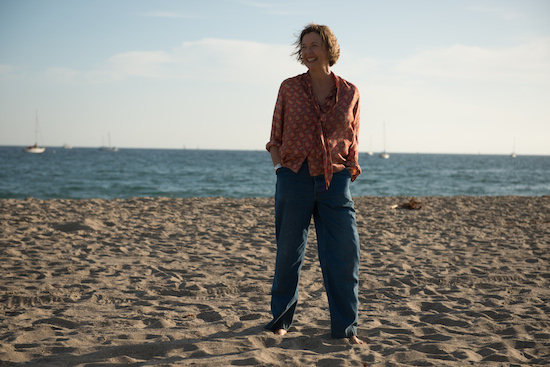By Nancy Novick
How do you raise a boy to be a good man? It’s a pressing question for Dorothea Fields (Annette Bening), a single mother living in a large, but ramshackle house in Southern California with her teen-aged son, Jamie, in Mike Mill’s remarkable new film, 20th Century Women.
Concerned that Jamie (the excellent Lucas Jade Zumann) is growing up without a man in his life, Dorothea initially tries to bring him closer to William (Billy Crudup) a carpenter and “recovering” hippie, who also lives in her house. When the relationship doesn’t take, she enlists the help of another tenant, Abbie (Greta Gerwig), a wounded young artist who styles her hair like David Bowie, and Julie (Elle Fanning), Jamie’s classmate who loves him too much to have sex with him, but sneaks into his bedroom at night to sleep beside him.
In an Oscar-worthy performance, Annette Bening portrays Dorothea as a lonely, quirky, and flawed woman, a deeply thoughtful and compassionate mother who smokes constantly, invites unlikely acquaintances in for dinner, and professes to fall in love with inappropriate partners. Bening looks like the 55-year-old woman she’s meant to be, and watching fear, hope, loneliness, and humor play over her Botox-free face is a beautiful thing. When Jamie, after reading the feminist books Abbie has given him, tells his mother he wants to learn how to please a woman, you can read the mixture of pride, embarrassment, and suppressed laughter in her expression.
Set in 1979, when the anxieties of the day focused more on personal identity and growing consumerism (Jimmy Carter’s speech on this subject is the focus of one scene) than on global terrorism, the world the film’s characters inhabit seems more innocent than today. People who came of age in that era are likely to find the film particularly poignant. But the film is likely to resonate with many viewers with less than conventional family backgrounds.
20th Century Women is billed as a comedy and delivers in a number of small scenes, as when Dorothea and William try dancing to the music of Black Flag, or when a drunk Abbie climbs into bed with Jamie to tell him he has to get out of this town “before you end up selling sunglasses in the mall,” only to find Julie is there as well. But Mills also doesn’t go for cheap laughs: a dinner party scene in which the men are encouraged to say the word menstruation aloud without embarrassment, starts out funny, then turns sad as Julie talks about her sexual experiences.
As Jamie’s world opens up with Abbie as his guide and Julie to provoke and encourage him, Dorothea tries to take more chances, too—including making a romantic connection with William—with mixed results. Throughout the film, even when she makes mistakes, we are completely on her side.
The movie’s tone also turns dark at times. The characters struggle with illness, heartbreak, growing up and letting go. But Mills story is ultimately uplifting. Before the credits roll, through voice-over narration, we are offered a glimpse of the characters’ futures; not everyone gets a happy ending, but they will have had the pain and pleasure of this moment in time together.
While it is now conventional wisdom to acknowledge that it takes a village to raise a child, 20th Century Women asserts that sometimes what it takes to bring that village together is a deeply loving mother who struggles past her own difficulties to connect with others.
20th Century Women is showing Saturday night only as part of the New York Film Festival, before going on to widespread release early next year. For more information, visit www.filmlinc.org.
Mills will also discuss the film at a free talk on Sunday.








What a wonderful, sensitive, and enticing review. Thank you!
I second that! Thank you.
Nice, but what the heck does this have to do with the UWS of NYC? Is WSR now an anything goes blog?
is this a review or an advertisement? Does any of the action take place in our neighborhood? What is Ms. Novick’s relationship to this film? Should an article of this nature be posted only hours before the screening takes place, thereby depriving most readers the opportunity to see this film until next year, at which point they may have forgotten about it? My point is, why is this article here now? Is the part of the “new” West Side Rag? Just wondering…
The NY Film Fest is a local event, and we’ve done some reviews like this in the past. The film was screened for reviewers only the day before so we weren’t able to post it far in advance. WSR
“While it is now conventional wisdom to acknowledge that it takes a village to raise a child”
someone’s not reading the recent WSR Comments. Seems to be strong objections to opening day care centers in facilities that should be put to better use.
And, oh yea…get outta’ here and move to France because “free child care is just absurd. Why would we want to pay taxes to care for someone else’s child???”
i think it may take a little longer for that ‘village’ idea to take hold.
or people could just have as many kids as they can afford to raise.
what a revolutionary idea!! but hey its not my money….
good one…Popcorn!!
“While it is now conventional wisdom to acknowledge that it takes a village to raise a child”
…just not here
Hooray for Hollywood!